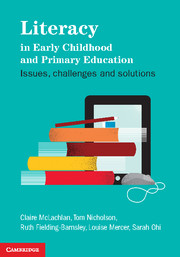Book contents
- Frontmatter
- Contents
- List of figures
- List of tables
- About the authors
- Acknowledgements
- Chapter 1 Introduction
- Part 1 Literacy acquisition: the child, the family and diversity in the modern world
- Part 2 Learning about literacy in early childhood settings
- Part 3 Literacy learning in the primary school
- Chapter 10 The first year of primary school: building on foundations
- Chapter 11 Establishing a community of readers
- Chapter 12 Uses of assessment in the primary school years
- Chapter 13 Reading and writing in the primary school: focus on narrative writing
- Part 4 Literacy learning in the senior primary school
- References
- Index
Chapter 12 - Uses of assessment in the primary school years
from Part 3 - Literacy learning in the primary school
- Frontmatter
- Contents
- List of figures
- List of tables
- About the authors
- Acknowledgements
- Chapter 1 Introduction
- Part 1 Literacy acquisition: the child, the family and diversity in the modern world
- Part 2 Learning about literacy in early childhood settings
- Part 3 Literacy learning in the primary school
- Chapter 10 The first year of primary school: building on foundations
- Chapter 11 Establishing a community of readers
- Chapter 12 Uses of assessment in the primary school years
- Chapter 13 Reading and writing in the primary school: focus on narrative writing
- Part 4 Literacy learning in the senior primary school
- References
- Index
Summary
Chapter objectives
To develop an understanding of the roles of assessment during the primary school years (assessment for, as and of learning).
To examine the important role of self-assessment within the assessment process (assessment for and as learning).
To develop an understanding of accountability (particularly the question of accountability for what in the assessment of learning).
To develop an understanding of the key domains of literacy assessment.
To critically examine a range of methods for assessing and documenting pupils’ developing literacy skills and strategies across these key domains during the primary years.
Assessment is always hot on the agenda of teachers, and with the move to ‘high-stakes’ assessment teachers feel increasing pressure to teach to the test. One of the major themes of this chapter is accountability, particularly the question of accountability for what? It takes a fresh look at self-assessment and how the learner needs to be an integral partner in the assessment process. Building on Chapter 9, which covered effective assessment in early education settings, this chapter examines recent research on the most effective ways to assess pupils’ ongoing acquisition of literacy in the K–6 grades. Research evidence on the effectiveness of common literacy assessments is reviewed and recommendations for practice with diverse learners are considered.
- Type
- Chapter
- Information
- Literacy in Early Childhood and Primary EducationIssues, Challenges, Solutions, pp. 209 - 233Publisher: Cambridge University PressPrint publication year: 2012



